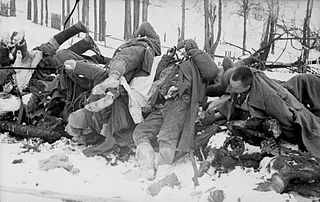
World War II was the deadliest military conflict in history. An estimated total 70-85 million people perished, which was about 3% of the 1940 world population.
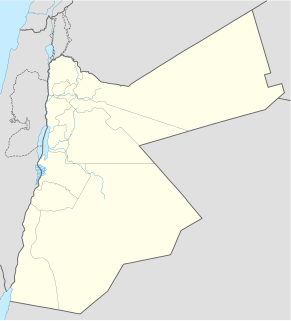
Irbid, known in ancient times as Arabella or Arbela, is the capital and largest city of the Irbid Governorate. It also has the second largest metropolitan population in Jordan after Amman, with a population of around 1,770,158. Irbid is located about 70 kilometres (43 mi) north of Amman on the northern ridge of the Gilead, equidistant from Pella, Beit Ras (Capitolias), and Um Qais, and approximately 20 kilometres (12 mi) south of the Syrian border.

The Banu Qasi, Banu Kasi, Beni Casi or Banu Musa were a Muwallad dynasty that ruled the upper Ebro valley in the 9th century, before being displaced in the first quarter of the 10th century.

Tamerlane chess is a strategy board game related to chess and derived from chaturanga. It was developed in Persia during the reign of Timur, also called Tamerlane (1336–1405). Some sources attribute the game's invention to Timur, but this is by no means certain. Because Tamerlane chess is a larger variant of chaturanga, it is also called Shatranj Kamil or Shatranj Al-Kabir, as opposed to ash-shaghir. It is distinctive in that there are varieties of pawn, each of which promotes in its own way.

Einhausen is a community in the Bergstraße district in Hesse, Germany, some 15 km east of Worms.
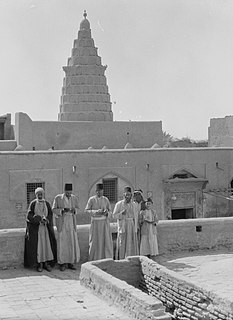
The history of the Jews in Iraq is documented from the time of the Babylonian captivity c. 586 BC. Iraqi Jews constitute one of the world's oldest and most historically significant Jewish communities.
Muhammad Alawi al-Maliki (1944–2004) was a Sunni (Sufi) Islamic scholar from Saudi Arabia.
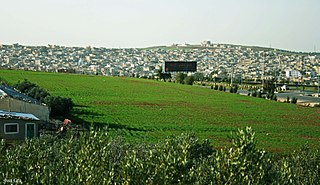
Al Husun is a town in northern Jordan, located 65 km (40 mi) north of Amman, and about 7 km (4 mi) south of Irbid. It has a population of 35,085. The region has fertile soil which along with the moderate climate allows the growing of high quality crops. Al Husn was known for its wine; now its main products are wheat and olive oil. Al Husn is registered in Jordanian government documents with the spelling 'Al Husun', and it is the administrative center of the Bani Obaid district.
Nationality words link to articles with information on the nation's poetry or literature.

Hausen am Albis is a village in the district of Affoltern in the canton of Zürich in Switzerland.

Eissen is a Westphalian village with 718 inhabitants in North Rhine-Westphalia and part of the town of Willebadessen, district Höxter in the administrative region of Detmold.
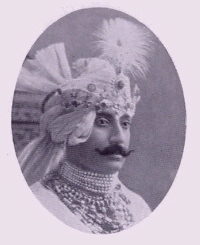
Sayyid Sir Wasif Ali Mirza Khan Bahadur was the Nawab of Murshidabad during 1906–1959. Sir Wasif Ali Mirza was educated at Sherborne School, Rugby School and later at Trinity College. He succeeded his father Hassan Ali Mirza Khan Bahadur at his death on 25 December 1906. On 11 December 1931, Wasif Ali was forced to surrender the administration of his estates to the Government of India after incurring a debt of ₹19 lakhs. On 15 August 1947, the Radcliffe Award allotted the district of Murshidabad to Pakistan and the Flag of Pakistan was hoisted at the Hazarduari Palace but within two days the two dominions exchanged Khulna, which is now in Bangladesh, and then the Flag of India was hoisted at the grand palace on 17 August 1947. The Government of India also resumed him all his estates in 1953. Wasif Ali was also the founder and president of the Hindu-Muslim Unity Association in the year 1937, named Anjuman-e-Musalman-e-Bangla, which promoted Hindu-Muslim unity. The Nawab also built the Wasif Manzil.
Mind monkey or monkey mind, from Chinese xinyuan and Sino-Japanese shin'en 心猿 [lit. "heart-/mind-monkey"], is a Buddhist term meaning "unsettled; restless; capricious; whimsical; fanciful; inconstant; confused; indecisive; uncontrollable". In addition to Buddhist writings, including Chan or Zen, Consciousness-only, Pure Land, and Shingon, this "mind-monkey" psychological metaphor was adopted in Taoism, Neo-Confucianism, poetry, drama, and literature. "Mind-monkey" occurs in two reversible four-character idioms with yima or iba 意馬 [lit. "thought-/will-horse"], most frequently used in Chinese xinyuanyima 心猿意馬 and Japanese ibashin'en 意馬心猿. The "Monkey King" Sun Wukong in the Journey to the West personifies the mind-monkey. Note that much of the following summarizes Carr (1993).
Jalaluddin Ahsan Khan was the first Sultan of Madurai Sultanate and father-in-law of the North African Arab traveler Ibn Batutah.

Howsham is a village and civil parish in the Ryedale district of North Yorkshire, England. It is home to a small parish church and Howsham Hall. Howsham appeared as Husun in the Domesday Book. The village is part of the historic East Riding of Yorkshire.
Husun As Salasil is a village in eastern Yemen. It is located in the Hadhramaut Governorate.
Husun As Sufayra' is a village in eastern Yemen. It is located in the Hadhramaut Governorate.
Husun Bin Humam is a village in eastern Yemen. It is located in the Hadhramaut Governorate.
The following is a timeline of the Syrian Civil War from May to August 2012. The majority of death tolls reported for each day comes from the Local Coordination Committees, an opposition activist group based in Syria, and the Syrian Observatory for Human Rights, another opposition group based in London.

Monkeys, particularly macaques and monkey-like gibbons, have played significant roles in Chinese culture for over two thousand years. Some examples familiar to English speakers include the zodiacal Year of the Monkey, the Monkey King Sun Wukong in the novel Journey to the West, and Monkey Kung Fu.














